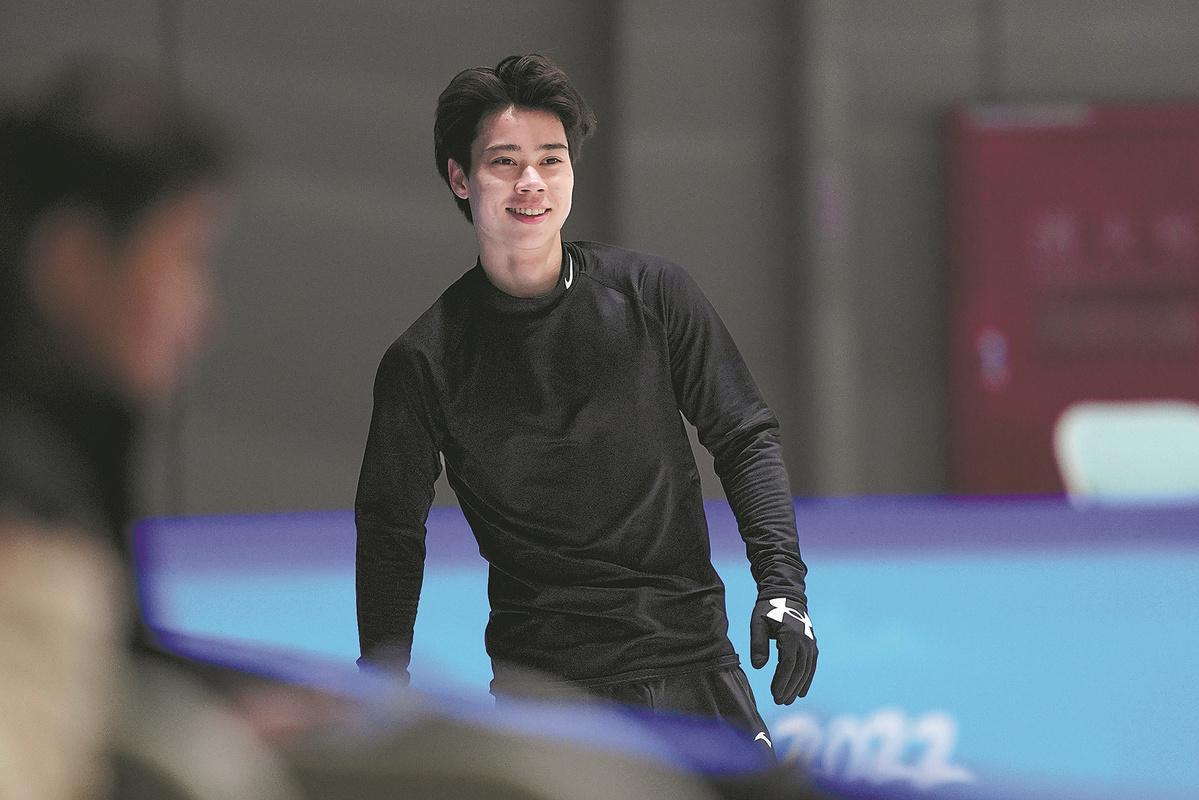
 0 Comment(s)
0 Comment(s) Print
Print E-mail China Daily, November 11, 2024
E-mail China Daily, November 11, 2024
No longer a world-class contender in events that were traditionally its strength, China's figure skating national program is bracing itself for a bleak Winter Olympic campaign in Italy, yet staying upbeat for the future beyond 2026.
With some of the team's accomplished veterans retiring after the Beijing 2022 Winter Games, Chinese figure skating launched a rebuild under new manager Yao Jia, who took over the once celebrated program last year, with its focus reset on honing the next-generation of skaters for the 2026 Games and beyond.

Men's singles skater Dai Dawei enjoys a light moment during a training session at the Capital Indoor Stadium. XINHUA
Filled by a group of fresh-faced youngsters with limited experience of the Grand Prix series, the Chinese squad is approaching the lead-up to Milan-Cortina 2026 with a pragmatic mindset as it tries to qualify as many skaters as possible for the Games through the 2025 world championships in March and the following Olympic qualifiers, knowing that, should they qualify, very few on its current roster boast medal-winning credentials.
Still, they won't give up pushing, even though they are starting from square one, having to qualify for next year's worlds.
"It's really hard for us (to achieve great international results) in the 2026 Olympic cycle, yet we are trying with a collective effort for the best possible outcome. We won't give up on the Milan-Cortina Games," manager Yao said during a recent open training session in Beijing.
"The 2030 edition (French Alps) in six years is our main target. From the performances of our young talent at the world junior events, we've drawn confidence for the future. Hopefully, they can keep improving on the international stage," said Yao, who served as the event director for figure skating at Beijing 2022.
According to International Skating Union rules, athletes have to reach the "technical minimums" — a combined score of short program and free skate in men's and women's singles, pairs and ice dance, respectively — at any ISU-sanctioned international event to be eligible for the worlds.
Team China currently has three men's singles skaters, led by veteran Jin Boyang, and only one woman, An Xiangyi, to have met the minimums, while none of China's pairs or ice dance teams have reached the benchmark yet.
It's a far cry from the good old days, when generations of world-class pairs skaters — the latest being 2022 Olympic champions Han Cong and Sui Wenjing — had kept Team China on the podium at multiple worlds and Olympics dating back to 2006.
With Han hanging up his skates after Beijing 2022, and Sui not yet ready to return to the rink, maintaining the country's glorious tradition in pairs skating seems like it might be too big a task for young combo Yang Yixi and Deng Shunyang this time around, having only just progressed from junior events to the senior circuit this season.
Both starting at a youth gymnastics program in their native Guangxi province, the 17-year-old Yang and her 20-year-old partner Deng, made a bold decision in 2018 to switch to a winter sport that they'd never tried, believing that their fitness, strength and agility honed on mats and bars would help on ice.
The basics of skating, though, have proved to be the biggest challenge to their ambitions, even though they've perfected some high-difficulty jumps, lifts and spirals to elite standards.
Their fast progress on ice, highlighted by a bronze-medal finish in their senior international debut at last month's Shanghai Trophy 2024, bodes well for such cross-sport experiments to deliver further breakthroughs.
"I think we have sort of an advantage technically and physically from our years in gymnastics, as well as in the chemistry between us," Yang said.
"Our weakness remains the fundamental parts of skating, step sequences and the flow of our movement on ice," Deng added.
"Of course, we need more serious drills quickly to make up for our lack of experience on the big stage," he said.
The next invaluable test comes on home ice later this month, when China's youngsters take on the world's best at the Cup of China, the Grand Prix season's sixth and final leg, to be held in Chongqing from Nov 22-24.
As is normal for the host, Team China has been granted a full quota of entries in all four disciplines at the Chongqing meet, which will serve as a key opportunity for more Chinese skaters to achieve the minimum scores required to qualify for the worlds, and, in turn, earn the chance to fight for an Olympic berth.
"Our goal is to make the most out of our advantage as host in the participation quotas in order to provide the relatively inexperienced squad with much-needed international drills," said Yao.
As their senior counterparts struggle to catch up with their international peers, China's junior skaters have heralded a bright, not-so-distant future by capping off an impressive 2024 season.
After competing at five of the seven junior Grand Prix events, China's youth team has won four golds, one silver and two bronze medals to secure three qualification berths in both singles and pairs at next year's junior world championships in Hungary.
China's No 1 junior pair, Zhang Jiaxuan and Huang Yihang, also became the world's only team this season to have won two titles on the junior circuit, raising long-term hopes for Team China to regain its competitive edge in the discipline.
"We have some quite promising young athletes in pairs skating as a strong reserve. They have a lot of potential for elite results at the senior level in the long term," said Guan Jinlin, the pairs coach for Team China.